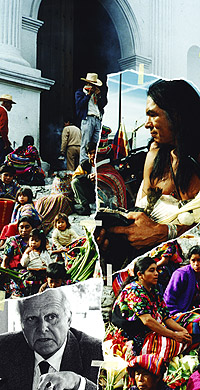
Moving clockwise from top, the images are 1: Guatemala: Market place (Maryse Peguat-Toquet/WCC); 2: Geneva, Switzerland, 1997: 15th session of the UN Working Group on Indigenous Peoples (Catherine Alt/WCC); 3: Guatemala: Market place (Maryse Peguat-Toquet/WCC); 4: Glion, Switzerland, 1986: Dr Carl-Friedrich von Weizsaecker at the international consultation on justice, peace and the integrity of creation (Peter Williams/WCC).
A resistance
A key insight was that the struggle for JPIC is a single struggle, and that engagement in it is not an optional extra for the churches, but part of the very nature of being the church.
Historically, the Council had devoted far more attention to justice and peace than to creation. In giving shape to the new ecumenical discussion of creation a special attempt was made to listen to theologies other than that of the West, with its particular stress on human dominion over creation.
Among the voices heard were those of indigenous peoples. Ecumenical awareness of their concerns had been heightened by the presence of indigenous peoples from Canada at the Vancouver assembly and of Aboriginal peoples from Australia at the Canberra assembly in 1991.
In the face of the forces of death, indigenous peoples and others who have been forced to the margins have taught the ecumenical movement lessons about Christian hope such as that expressed by the final document of the 1990 convocation on JPIC in Seoul:
movement
against
fatalism
JPIC was not a matter of the Council's undertaking new programmes of its own. The focus was rather on calling the churches to enter into mutual commitments to counter injustice, war and violence, and environmental destruction.
Conversion is the door to a new and firm hope -- the conviction that the course of history can be changed. We are easily overcome by doubts. Christian hope is a resistance movement against fatalism. We want to share this hope with all people. We want to learn from their experience and from the hope by which they are sustained in their struggle.